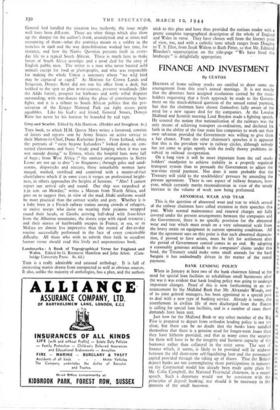FINANCE AND INVESTMENT
By CUSTOS
HOLDERS of home railway stocks are entitled to draw some en- couragement from this year's annual meetings. It is not merely that the directors have accepted resolutions carried by the stock-
holders requesting that a fresh approach be made to the Govern- ment on the much-debated question of the annual rental payment, but that the chairmen have shown themselves fully aware of the need for a new square deal for the companies. At the London Midland and Scottish meeting Lord Royden made a fighting speech. He scouted the notion that nationalisation of the railways was the only means of achieving transport co-ordination, and declared his faith in the ability of the four main line companies to work out their own salvation provided the Government was willing to give them a fair chance. From the other chairmen's speeches it is apparent that this is the prevalent view in railway circles, although nobody has yet come to grips openly with the really thorny problems in- volved in railroad co-operation.
On a long view it will be more important from the rail stock- holders' standpoint to achieve stability in a properly regulated transport system than to persuade the Government to adjust the war-time rental payment. Nor does it seem probable that the Treasury will yield to the stockholders' pressure by amending the present agreement. There is one aspect of railway finances, how- ever, which certainly merits reconsideration in view of the steady increase in the volume of work now being performed.
ABNORMAL WEAR AND TEAR This is the question of abnormal wear and tear to which several of the railway chairmen have called attention in their speeches this year. While normal maintenance and renewal charges are fully covered under the present arrangements between the companies and the Government, there is no specific provision for the abnormal wear and tear which must result on a very substantial scale from the heavy strain on equipment in current operating conditions. All that the agreement says on this point is that such abnormal deprecia- tion, if proved to have arisen, must be left for settlement after the period of Government control comes to an end. By adopting a reasonably generous attitude to the companies' claims under this head, the Treasury could make some small amends for the hard bargain it has undoubtedly driven in the matter of the rental payment.
BANK LENDING POLICY When in January at least two of the bank chairmen hinted at the need for special loan facilities to rehabilitate small businesses after the war it was evident that bank lending policy was going to undergo important changes. Proof of this is now forthcoming in an an- nouncement by the Midlalid Bank that Mr. Alexander Woods, one of its joint general managers has been appointed to a special post to deal with a new type of banking service. Already it seems, the resettlement in civilian life of men discharged from the Forces is calling for special loan facilities, and in a number of cases these demands have been met.
Just how far the Midland Bank or any other member of the Big Five is prepared to depart from orthodox lending policy is not yet clear, but there can be no doubt that the banks have satisfied themselves that there is a genuine need for longer-term loans than they have hitherto provided, and that in many cases the security for them will have to be the integrity and business capacity of the borrower rather than collateral in the strict sense. The sort of finance which, it seems, is likely to be provided will lie midway between the old short-term self-liquidating loan and the permanent capital provided through the taking up of shares. That the British deposit banks are not contemplating share participations in industry on the Continental model has already been made quite plain by Mr. Colin Campbell, the National Provincial chairman, in a recent speech. Such a departure would not be consistent with the principles of deposit banking,' nor should it be necessary in the interests of the small borrower. tz Is at; in 0 81 of at as of th
to
ra sh or de Pa 10 ay} 'if


























 Previous page
Previous page